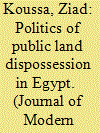|
|
|
Sort Order |
|
|
|
Items / Page
|
|
|
|
|
|
|
| Srl | Item |
| 1 |
ID:
173865


|
|
|
|
|
| Summary/Abstract |
This article examines changes in the allocation of urban land in Egypt between 1975–2011 with the rise and incorporation of state authoritarianism and neoliberal economics in what I call ‘authoritarian neoliberalism’. Authoritarian neoliberalism in Egypt transferred ownership of urban lands from public wealth to an affluent class of local and foreign capitalists – often in a non-transparent fashion. The article focuses on the government's legally sanctioned practices of subsidisations, privatisations and evictions as they relate to what I call, inspired by David Harvey's formulation, the accumulation of wealth by dispossession. Dispossession of public urban land, I maintain, generated widespread resentment that played a vital, but inadequately discussed, role in the series of revolts that culminated in the 2011 uprising in Egypt. Social tensions engendered in this authoritarian neoliberal regime, I argue, endure under the administration of President Abdel Fattah el-Sisi, who continues to transfer public urban lands, from lower to higher socioeconomic classes, at an even faster pace than his predecessor.
|
|
|
|
|
|
|
|
|
|
|
|
|
|
|
|
| 2 |
ID:
190803


|
|
|
|
|
| Summary/Abstract |
The causes, consequences, and trajectory of the 2011 uprising in Egypt have been and continue to be a subject of scholarly debate. This article is situated within this debate with a particular focus on the role of political economy factors in engendering democracy and democratic transition. The key research objectives are to address why the Egyptian people came together in 2011 in an unprecedented show of solidarity to overthrow the Hosni Mubarak regime, to evaluate the interpretive frames for this uprising from two overlapping but fundamentally opposed perspectives—liberal democracy and radical democracy; to assess the extent to which the adoption of neoliberalism, accompanied by poverty and inequality, played a role in fomenting the countermovement against the regime; and to identify the underlying structures and process that links the 2011 uprising to the regime of Abdel Fattah al-Sisi. The article concludes that the imposition of a neoliberal regime of capital accumulation, with dispossession and upward wealth redistribution at its heart, created the conditions for the rise of radical democratic mass movements that overthrew both Mubarak and Mohammed Morsi. The article further underlines that the regime of Abdel Fattah al-Sisi not only halted the democratic reforms demanded by the Egyptian people but continues, at a faster pace, to impose the same neoliberal economic restructuring that catalyzed the uprising in the first place.
|
|
|
|
|
|
|
|
|
|
|
|
|
|
|
|
|
|
|
|
|